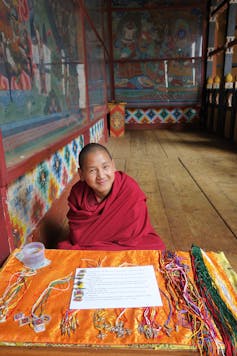- Get link
- X
- Other Apps
What can the kingdom of Bhutan teach us
Bertrand Venard, AudenciaFighting corruption is supremely difficult, as it is proved by the recent expulsion of UN anti-corruption mission in Guatemala, the jail sentence of a former Korean President or the murder of an African journalist investigating corruption.
Considering the huge cost of corruption, many experts and observers would recommend looking at public policy or business practices in place in countries such as Denmark or Finland, known for being transparent and accountable societies. Yet countries such as Bhutan, in the heart of the Himalayas, can provide original approaches in dealing with anti-corruption policies.
On the path of the Thunder Dragon
Known as the Thunder Dragon Kingdom, Bhutan has embarked on the path of democracy in recent years, bringing on a series of social-economic changes while opening up to the world. Yet, it ranks among the poorest countries in the world with 12% of its population below national poverty line.Bhutan is also surrounded by South Asian states with high level of corruption, in particular India and Bangladesh. Despite its own challenges and according to the Corruption Perception Index 2017 of the NGO Transparency International, Bhutan ranks 26th out of 180 countries, while much richer countries do not fare so well: Poland (36th), Spain (42nd), China (77th) or India (81st).
The results indicate that Bhutan may be a good example in a quest for effective anti-corruption policies. How did it manage so well despite the odds? And what can we learn from its experience?
Loss of personal power for the public good

In the fight against corruption, it’s essential to avoid hypocrisy – preaching good while acting badly. To avoid such behaviour, in Bhutan real actions and accomplishments are celebrated rather than mere words. There as in many countries, corruption is usually defined as the abuse of power for private gain against the public good. Bhutanese history offers some explanations that are linked to the Wangchuck sovereigns, called Druk Gyalpo or Dragon Kings.
King Jigme Singye Wangchuck (reign 1972-2006) has been able to demonstrate how a leader acts without corruption and how he embodied ethical principles. Indeed, in 2006, he abdicated in favour of a democratic process in which most of the monarch’s power was transferred to a Council of Ministers and an elected Parliament. The first democratic elections were held in 2007.
The monarchy sustained through the fifth and current Druk Gyalpo King Jigme Khesar Namgyel Wangchuck, who followed the same ethics as his father. In doing so, he also embodied what is antonymic to corruption: the loss of personal power for the public good.
Making corruption a collective issue
Involving the population in public life through elections marked a crucial change for Bhutan. In this Buddhist country, acting collectively is part of the culture, especially in the fight against corruption.While compliance programs today often stress the importance of paying attention to leaders, the Bhutanese approach the fight against corruption as a multiple-stakeholder question, and result in collective actions,
Pupils, students, professionals, corporate executives, journalists and civil servants are involved at different levels to address and look at corruption from their own unique perspectives. For example, in investigated the country’s mining sector, the country’s Anti-Corruption Commission (ACC) interviewed a wide range of stakeholders, including mine representatives and inspectors, environment and forest officers and local leaders and representatives.
This process do not limit investigations to a small group of specialists, making anti-corruption actions more inclusive.
Permanent anti-corruption and integrity benchmark
A danger in any anti-corruption program is to follow only minimal practices. For example, to limit the judicial liability of a firm, its compliance department could be required to follow existing guidelines, paying attention to the respect of standard anti-corruption rules rather looking at the effectiveness of these rules.In Bhutan, the Anti-Corruption Commission and other experts look for effective methods and adapt them to the context of Bhutan. Concretely, the ACC staff compare the commission’s strategy, policies and actions to those of other agencies around the world, ask foreign experts to come to Bhutan to give advice, go abroad to learn about the latest policies.
Evidence-based anti-corruption policy
In general, most countries and organisations do not conduct research themselves and don’t base their anti-corruption decisions on research. While corruption has been shown to have a negative impact on economic growth, academic investments are made to deeply understand it.In Bhutan, however, decision makers are working to build data-driven strategies in many areas. Bhutan has conducted several scientific inquiries to understand the causes, consequences and ways of reducing corruption. For example, the ACC studied corruption in the public road construction with a collaborative survey assisted by Ministry of Works and Human Settlement, Ministry of Finance and the Royal University of Bhutan. Findings detailed issues involving dishonesty, problems with monitoring and enforcement, undue influence and unfair practices.
Ethical indicators

To ensure the success of any anti-corruption action, indicators are necessary to follow its progress. The strategy set up by the King of Bhutan, the politicians and civil servants is part of the original policy of achieving the population’s Gross National Happiness, which puts happiness rather than wealth as the main objective of the country. Thus, the country has managed to develop its own overall performance index not on Gross Domestic Product but rather on (Gross National Happiness Index (GNHI).
The GNH index includes several measurements of corruption, thus making anti-corruption policy is part of the national well-being strategy. Bhutanese leaders and other stakeholders have designed some holistic “key performance indicators” to monitor the anti-corruption policy and its results.
For example, the regular National GNH Survey seeks to clarify areas in which the conditions for happiness exist. It includes questions about corruption, including where public action is required. For example, the Ministry of Education regularly evaluates integrity levels in its programmes and trainings. The success of an anti-corruption policy is thus due to its integration in a broader ethical vision as well as having specific targets.
While Bhutan still faces some corruption problems, including 2018 case of irregularities in construction bids, the country’s success in the fight against corruption has been impressive. It is time for other countries to both learn from their inspiring ideas and apply them.
Bertrand Venard, Professor, Audencia
This article is republished from The Conversation under a Creative Commons license. Read the original article.